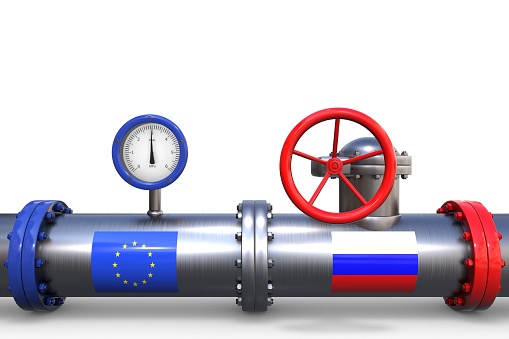Five months after the Russian invasion of Ukraine, Europe now appears to be facing an acute energy crisis. While maintenance work on the Nord Stream pipeline by Gazprom continues, European countries are concerned about a possible complete freeze on supply from Russia in response to the sanctions they have put in place.
A recent study by the IMF attempts to quantify the potential effects of a total cutoff of Russian natural gas supplies to Europe. The main conclusion of the study is that its complete replacement will be difficult in the short term.
The flow of natural gas through pipelines from Russia has fallen by 60% since mid-2021. So far, European governments have been able to offset this decline either by increasing imports from other gas suppliers (liquefied or through pipelines), or by changing the energy mix they use by adopting alternative energy sources (see previous note). If this situation continues, Europe will be able to offset two-thirds of Russian gas within the next 12 months. However, a total interruption of supply today would cause significant losses to the European economies.
To assess the impact on European economies, IMF analysts are studying two scenarios. The first assumes that the natural gas market is integrated , i.e. there are no shortages in the gas market, demand can be met, and any change in supply is reflected in the prices faced by consumers. This first case represents the market as it is today. The second scenario studies a more unfavorable scenario in which the market is fragmented , i.e. the supply of natural gas is either insufficient or, due to disruptions in the supply chain, unable to meet demand. In this scenario, European states try to meet their needs in competition with each other, resulting in shortages, while prices do not clear the market.
The graph presents the estimate of the possible economic impact (percentage reduction of GDP) of a total interruption in the supply of Russian natural gas. Central and Eastern European countries (Hungary, Slovakia, Czech Republic), with a high degree of dependence and little capacity to substitute Russian natural gas, are more affected. Next are the large economies of Germany and Italy. Our country is relatively low in terms of the economic impact of the freeze on the flow of Russian natural gas. Under the fragmented market scenario , Greece has alternatives (imports of liquefied gas, as well as natural gas via pipelines from other suppliers), resulting in the estimated GDP reduction ranging from -0.6% to -0.8%. Under the integrated market scenario, with possible higher price growth, the impact can be more significant but also more uncertain: the IMF study estimates it to range from -0.4% to -1.4%.
The IMF study shows that the impact of the Russian gas supply freeze will have an asymmetric impact on European economies. The challenge for European governments is to boost efforts to find alternative energy suppliers, and to deepen their cooperation in distributing available reserves to avoid shortages. Will Europe be able to build on the solidarity of the pandemic crisis in order to face the new energy crisis in a coordinated manner?




